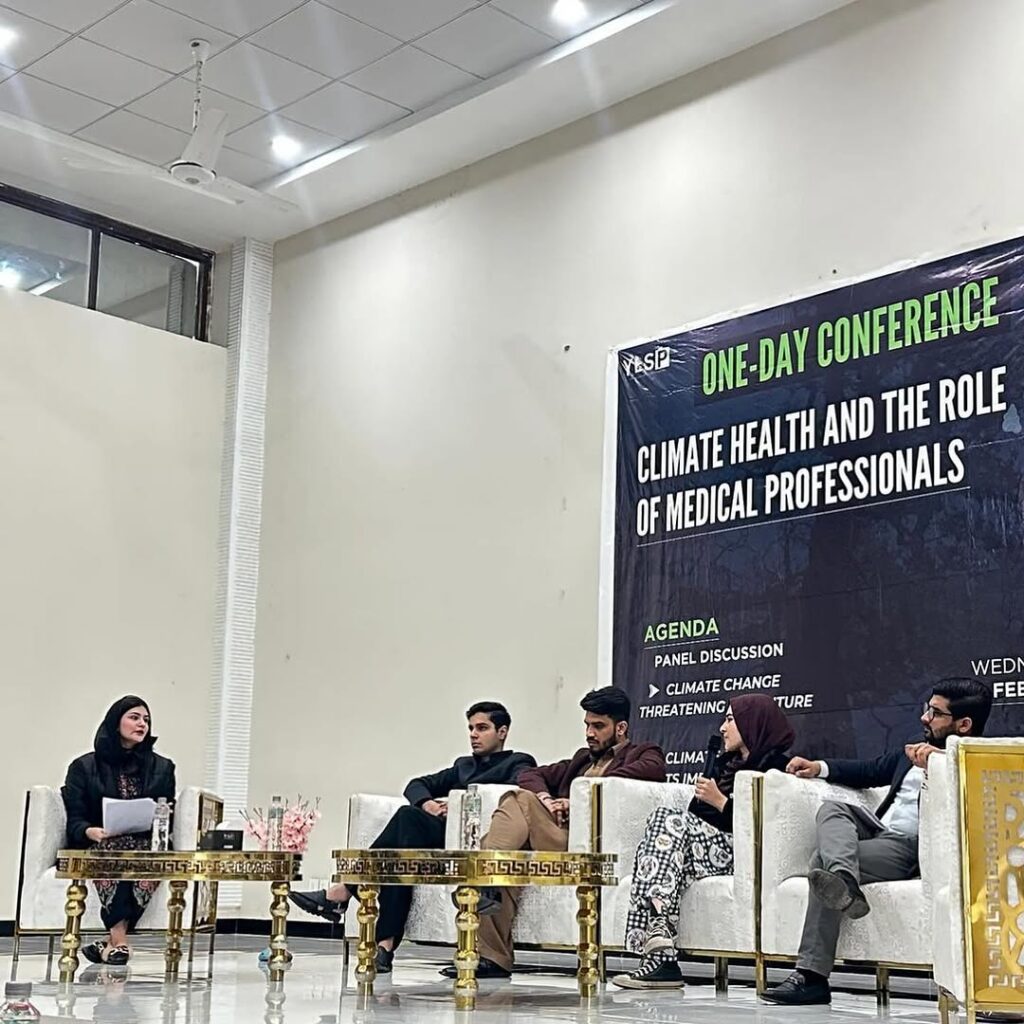A Groundbreaking Dialogue on Climate and Health
The Young Leaders Society Pakistan (YLSP), in collaboration with IIUI School, Khyber Campus, hosted a pivotal one-day conference titled “Climate, Health, and the Role of Medical Professionals” on February 26, 2025. This significant event brought together healthcare experts, environmentalists, policymakers, and youth leaders to examine the critical intersection between climate change and public health. As global temperatures rise and extreme weather events become more frequent, the conference highlighted the urgent need for climate-conscious healthcare solutions and the vital role medical professionals must play in addressing these challenges.
Setting the Stage: Panel Discussions That Sparked Change
The first panel discussion, “Climate Change Threatening the Future,” moderated by Fatima Faraz, President of YLSP KPK Region, set a compelling tone for the day. Tabish Hamid, President of YLSP, emphasized the power of youth advocacy in driving climate-resilient health policies, while Jamaima Afridi, an acclaimed journalist and filmmaker, stressed media’s role in amplifying the voices of marginalized communities affected by climate-related health disparities. Marukh Zahir, an educationist and tribal representative, brought indigenous perspectives to the table, showcasing how traditional knowledge could complement modern climate adaptation strategies. Dr. Habib from the Environmental Protection Agency rounded out the discussion by addressing critical policy gaps in environmental health regulations.
Exploring Solutions: Healthcare in a Warming World
The second panel, “Healthcare in a Warming World: Challenges and Solutions,” moderated by Dr. Ayesha Khan, delved into practical challenges facing Pakistan’s healthcare system. Dr. Saad Ahmed, a public health specialist, warned of increasing vector-borne diseases like dengue and malaria due to shifting weather patterns. Dr. Rabia Shah, a climate and health researcher, presented alarming data on heatstroke mortality rates, advocating for stronger emergency response systems. Dr. Imran Yousaf, an emergency medicine consultant, shared harrowing frontline experiences and stressed the need for disaster-ready medical training programs to prepare healthcare workers for climate-related crises.
A Vision for the Future: Keynote Address Inspires Action
Dr. Asad Malik, WHO Representative, delivered a powerful keynote address titled “The Future of Medicine in the Age of Climate Crisis.” He challenged medical professionals to view climate action as part of their ethical duty, citing successful global examples of sustainable healthcare practices. Dr. Malik proposed concrete solutions like developing green hospitals with solar energy systems, implementing climate-smart disease surveillance networks, and launching doctor-led awareness campaigns in vulnerable communities. His address left attendees with both a sense of urgency and a clear roadmap for action.
Building Connections: Networking for Lasting Impact
The conference concluded with an energetic networking session where medical students, environmental activists, and policymakers exchanged ideas and formed valuable connections. This interactive segment fostered discussions about local initiatives and potential collaborations, ensuring the conference’s insights would translate into tangible community projects. The closing remarks reinforced YLSP’s commitment to continuing this crucial dialogue through policy advocacy, specialized training programs, and expanded partnerships between health and environmental sectors.
The Road Ahead: From Discussion to Implementation
This landmark conference succeeded in bridging the gap between climate science and medical practice while equipping future healthcare leaders with essential knowledge. YLSP announced plans to publish a comprehensive policy brief based on conference recommendations and establish a dedicated Climate & Health Task Force in collaboration with IIUI. With follow-up workshops planned across other provinces, this event marked just the beginning of a sustained movement to address one of Pakistan’s most pressing challenges – protecting public health in an era of climate crisis.
A Call to Action for Pakistan’s Medical Community
As the conference demonstrated, climate change is no longer just an environmental issue but a profound public health emergency. The enthusiastic participation and thoughtful discussions proved that Pakistan’s medical community stands ready to lead the charge in developing climate-resilient healthcare solutions. YLSP’s initiative has planted the seeds for transformative change – now it’s time for all stakeholders to nurture this movement and turn ideas into life-saving action.

